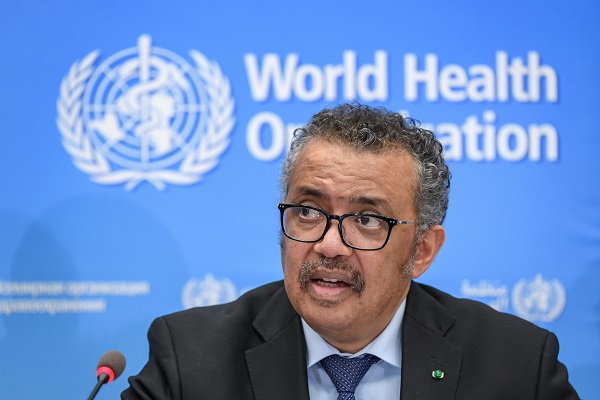
The director-general of the World Health Organization (WHO), Dr. Tedros Ghebreyesus, has said that over 9.4 billion doses of the COVID-19 vaccine have now been administered globally.
Speaking at the 10th meeting of the International Health Regulations (IHR) Emergency Committee on COVID-19, he, however, lamented that over 90 countries did not reach the target of vaccinating 40 per cent of their populations by the end of last year and 36 of those countries have not yet vaccinated 10 per cent of their populations.
He added that more than 85 per cent of the population of Africa – about one billion people – is yet to receive a single dose of the vaccine.
“[The year] 2021 gave us many reasons for hope, as science provided us with more tools to control the COVID-19 pandemic. However, we have also faced many hurdles, including politicisation, nationalism, short-term self-interest disinformation and more.
“This toxic combination has hampered the response, fuelled the transmission and evolution of the virus and hampered equitable access to the tools to prevent, detect and treat it. As a result, many countries cannot meet basic baseline needs or modest targets,” he said.
Ghebreyesus emphasised that the acute phase of the pandemic may never end unless everyone works together to close these gaps.
According to him, more than 15 million new cases of COVID-19 were reported to WHO from around the world last week – by far the most cases reported in a single week – which he averred was an underestimate.
He added that the huge spike in infections is being driven by the Omicron variant, which is rapidly replacing Delta in almost all countries.
He pointed out that WHO continues to track Omicron and other variants, adding it continues to assess the transmission of this virus, its severity and its impact on countermeasures, including vaccines.
The WHO boss further said that the organization established the Technical Advisory Group on COVID-19 Vaccine Composition, or TAG-CO-VAC, a group of experts to review the implications of variants of concern on vaccines.
“This week, TAG-CO-VAC said that more vaccines will be needed that have a greater impact on preventing infection and transmission, as well as severe diseases and death.
“Until such vaccines are developed, the composition of current COVID-19 vaccines may need to be updated, to ensure they continue to provide WHO-recommended levels of protection against infection and disease.
“TAG-CO-VAC also said that a vaccination strategy based on repeated booster doses of the original vaccine composition is unlikely to be sustainable.
“The group also emphasised that while some countries recommend boosters, the immediate priority for the world is accelerating access to primary vaccination, particularly for groups at greater risk of developing severe disease,” he stated.
Ghebreyesus noted that while vaccines remain very effective at preventing severe disease and death, they do not fully prevent transmission, stressing that more transmission means more hospitalisations, more deaths, more people off work, including teachers and health workers, as well as more disruption to essential social and health services.
“More transmission also means more risk of another variant emerging that is even more transmissible and more deadly than previous variants.
“The sheer scale and pace of transmission also mean more pressure on already overburdened and exhausted health and care workers.
“Ending the inequitable distribution of vaccines, therapeutics and diagnostics remain the key to ending the pandemic. If we end inequity, we end the acute phase of the pandemic,” he added.


